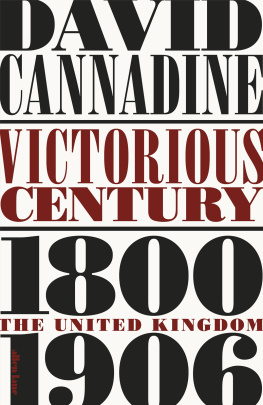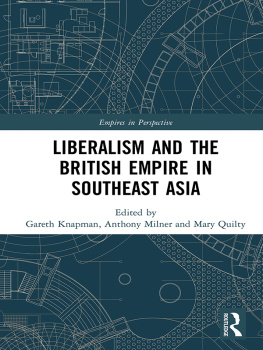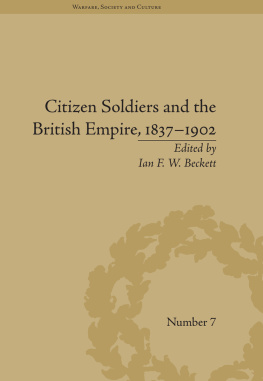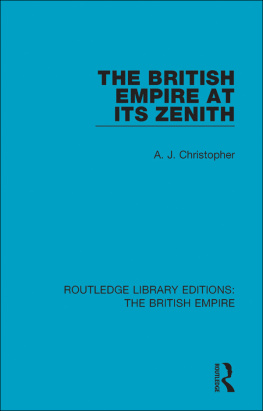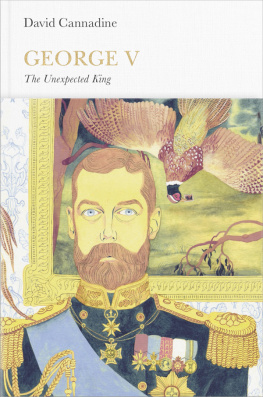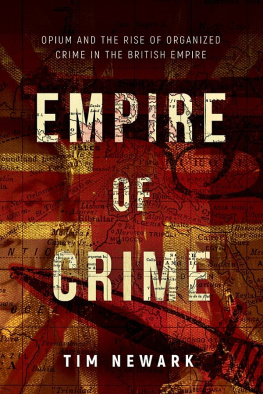David Cannadine - Ornamentalism: How the British Saw their Empire
Here you can read online David Cannadine - Ornamentalism: How the British Saw their Empire full text of the book (entire story) in english for free. Download pdf and epub, get meaning, cover and reviews about this ebook. year: 2002, publisher: Penguin, genre: Politics. Description of the work, (preface) as well as reviews are available. Best literature library LitArk.com created for fans of good reading and offers a wide selection of genres:
Romance novel
Science fiction
Adventure
Detective
Science
History
Home and family
Prose
Art
Politics
Computer
Non-fiction
Religion
Business
Children
Humor
Choose a favorite category and find really read worthwhile books. Enjoy immersion in the world of imagination, feel the emotions of the characters or learn something new for yourself, make an fascinating discovery.

- Book:Ornamentalism: How the British Saw their Empire
- Author:
- Publisher:Penguin
- Genre:
- Year:2002
- Rating:4 / 5
- Favourites:Add to favourites
- Your mark:
- 80
- 1
- 2
- 3
- 4
- 5
Ornamentalism: How the British Saw their Empire: summary, description and annotation
We offer to read an annotation, description, summary or preface (depends on what the author of the book "Ornamentalism: How the British Saw their Empire" wrote himself). If you haven't found the necessary information about the book — write in the comments, we will try to find it.
Ornamentalism: How the British Saw their Empire — read online for free the complete book (whole text) full work
Below is the text of the book, divided by pages. System saving the place of the last page read, allows you to conveniently read the book "Ornamentalism: How the British Saw their Empire" online for free, without having to search again every time where you left off. Put a bookmark, and you can go to the page where you finished reading at any time.
Font size:
Interval:
Bookmark:
PENGUIN BOOKS
ORNAMENTALISM
[An] impressively concise analysis of Britannia's perception of her wave-ruling exertions. Class is what concerns him, class in all its complex, Hydra-headed ferocity Ornamentalism takes its cue from class history, but is a far cry from its hard-boiled Marxist ancestors and all the more enjoyable in consequence Robert McCrum, Observer
A profoundly scholarly work about British imperialism which is so infused with a sense of the comic, the touching and the absurd that it is also splendid entertainment Jan Morris, BBC History
Scintillating prose [and] a fine eye for telling detail The book will give enormous pleasure Peter Marshall, Reviews in History
Among other things, the British Empire was a terrific show. It brought out the most theatrical side of its rulers No one has described this so well as David Cannadine since Jan Morris's great Pax Britannica trilogy Bernard Porter, The Times Literary Supplement
Illustrated with choice and witty examples it displays an unerring eye for the collusions of power and fantasy Sunil Khilnani, Financial Times
He displays all his characteristic virtues: the appetite to seize a large and controversial topic, the energy to synthesize a vast amount of published research about it, the ability to open it up afresh with a big, challenging, organizing idea, the clarity and vigour of exposition to make it available to a broad public Paul Smith, London Review of Books
The range of Cannadine's sources and the extent of his sweep are indeed impressive a thoroughly stimulating read it has important things to say about the continuing survival of strange forms of ornamentalism within Tony Blair's supposedly new Britain John MacKenzie, The Times Higher Education Supplement
The importance of Ornamentalism lies not just in making us rethink the past; it helps us to re-evaluate the present Kenan Malik, New Statesman
No historian exceeds him in wit, acuity and fluency; few are his equal in scholarship or sensitivity to evidence or language He is free of the restraints of both fashion and tradition his broad argument is convincing and extremely welcome Felipe Fernandez-Armesto, Literary Review
An enjoyably provocative book Simon Heffer, Country Life
I was seized by this witty account of how rank mattered more than colour how the British tried to identify an English class system in their tropical possessions Neal Ascherson, Observer
ABOUT THE AUTHOR
Professor David Cannadine was born in Birmingham in 1950, and educated at the universities of Cambridge, Oxford and Princeton. From 1975 to 1988 he was a Fellow of Christ's College, Cambridge, and University Lecturer in History, and he has taught at Columbia University, New York. He is now Director at the Institute of Historical Research, University of London. He is the editor and author of many acclaimed books, including The Decline and Fall of the British Aristocracy, which won the Lionel Trilling Prize and the Governors Award; The Speeches of Winston Churchill; Aspects of Aristocracy; G. M. Trevelyan; The Pleasures of the Past; History in Our Time; and Class in Britain. He is a member of the Editorial Board of Past and Present, and he is General Editor of the Penguin History of Britain series. He writes regularly for newspapers and reviews in London and New York, and is a well-known broadcaster on radio and television.
The Speeches of Winston Churchill, Aspects of Aristocracy, G. M. Trevelyan, The Pleasures of the Past, History in Our Time and Class in Britain are all published in Penguin.
How the British Saw Their Empire

PENGUIN BOOKS
PENGUIN BOOKS
Published by the Penguin Group
Penguin Books Ltd, 80 Strand, London WC2R 0RL , England
Penguin Putnam Inc., 375 Hudson Street, New York, New York 10014, USA
Penguin Books Australia Ltd, 250 Camberwell Road, Camberwell, Victoria 3124, Australia
Penguin Books Canada Ltd, 10 Alcorn Avenue, Toronto, Ontario, Canada M4V 3B2
Penguin Books India (P) Ltd, 11, Community Centre, Panchsheel Park, New Delhi 110 017, India
Penguin Books (NZ) Ltd, Cnr Rosedale and Airborne Roads, Albany, Auckland, New Zealand
Penguin Books (South Africa) (Pty) Ltd, 24 Sturdee Avenue, Rosebank 2196, South Africa
Penguin Books Ltd, Registered Offices: 80 Strand, London WC2R 0RL , England
www.penguin.com
First published by Allen Lane The Penguin Press 2001
Published in Penguin Books 2002
Copyright David Cannadine, 2001
The acknowledgements on p. 245 constitute an extension of this copyright page
All rights reserved
The moral right of the author has been asserted
Except in the United States of America, this book is sold subject to the condition that it shall not, by way of trade or otherwise, be lent, re-sold, hired out, or otherwise circulated without the publisher's prior consent in any form of binding or cover other than that in which it is published and without a similar condition including this condition being imposed on the subsequent purchaser
ISBN: 978-0-14-192777-0
For Guy
The real challenge will be to integrate the local and the general Only then will we glimpse whole worlds that have not been seen before. A synoptic view, bringing metropole and colony, colonizer and colonized, British and indigenous peoples into one frame, into a single analytical field, will reveal not merely a catalogue of differences and similarities, not just a series of intriguing parallels, but whole configurations, general processes, an entire interactive system, one vast interconnected world.
P. D. Morgan, Encounters between British and Indigenous Peoples, c. 1500c. 1800, in M. J. Daunton and R. Halpern (eds), Empire and Others: British Encounters with Indigenous Peoples, 16001850 (London, 1999), p. 68.
A perennial theme running throughout Britain's imperial experience has been the relationship between ideas about the ordering of society at home and ideas about the ordering of the empire overseas. For all the obvious difficulties involved in applying the same precepts to societies that are likely to have been fundamentally different, generations of British people have tried to do precisely this. British models [have] usually been projected on to the empire; less frequently what have been taken to be the lessons of Empire have been beamed back at Britain.
P. J. Marshall, Empire and Authority in the Later Eighteenth Century, Journal of Imperial and Commonwealth History, xv (1987), p. 105.
How do we describe people from a culture different from our own? It is the argument of this book that neither savagery nor race was the important category The really important category was status.
K. O. Kupperman, Settling with the Indians: The Meeting of English and Indian Cultures in America, 15801640 (Totowa, NJ, 1980), pp. vii, 2.
In post-millennial Britain, we live in post-imperial times. The captains and the kings have departed; the squadrons and the legions have come home; the plumed hats and the ceremonial swords have been put away; the Union Jack has been hauled down again and again and again; Britannia no longer rules the waves at Heaven's command; and even the royal yacht has ceased to sail the seas. The impulses towards overseas expansion and imperial domination that began in the reign of the first Elizabeth have ended with appropriate if coincidental symmetry in the time of the second Elizabeth. During the mere half century between Indian independence in 1947 and the return of Hong Kong to the Chinese government in 1997, the British Empire, once the earth's proudest and biggest, and for nearly three hundred years part of the seemingly immutable order of things, has passed away, and into history. It is now one, not just with Nineveh and Tyre, but also with the Roman, the Islamic, the Holy Roman, the Ottoman, the Venetian, the Spanish, the Portuguese, the Dutch, the French, the German and the Russian Empires both Tsarist and Communist. Only the United States of America remains as the last authentic western imperial power, deploying its unchallenged financial might and unrivalled military strength around the globe, even as it still prides itself on its exemplary hostility to empire, dating from the time when it was the first colony to make a revolution (and make a nation) by successfully rejecting European domination.
Next pageFont size:
Interval:
Bookmark:
Similar books «Ornamentalism: How the British Saw their Empire»
Look at similar books to Ornamentalism: How the British Saw their Empire. We have selected literature similar in name and meaning in the hope of providing readers with more options to find new, interesting, not yet read works.
Discussion, reviews of the book Ornamentalism: How the British Saw their Empire and just readers' own opinions. Leave your comments, write what you think about the work, its meaning or the main characters. Specify what exactly you liked and what you didn't like, and why you think so.

